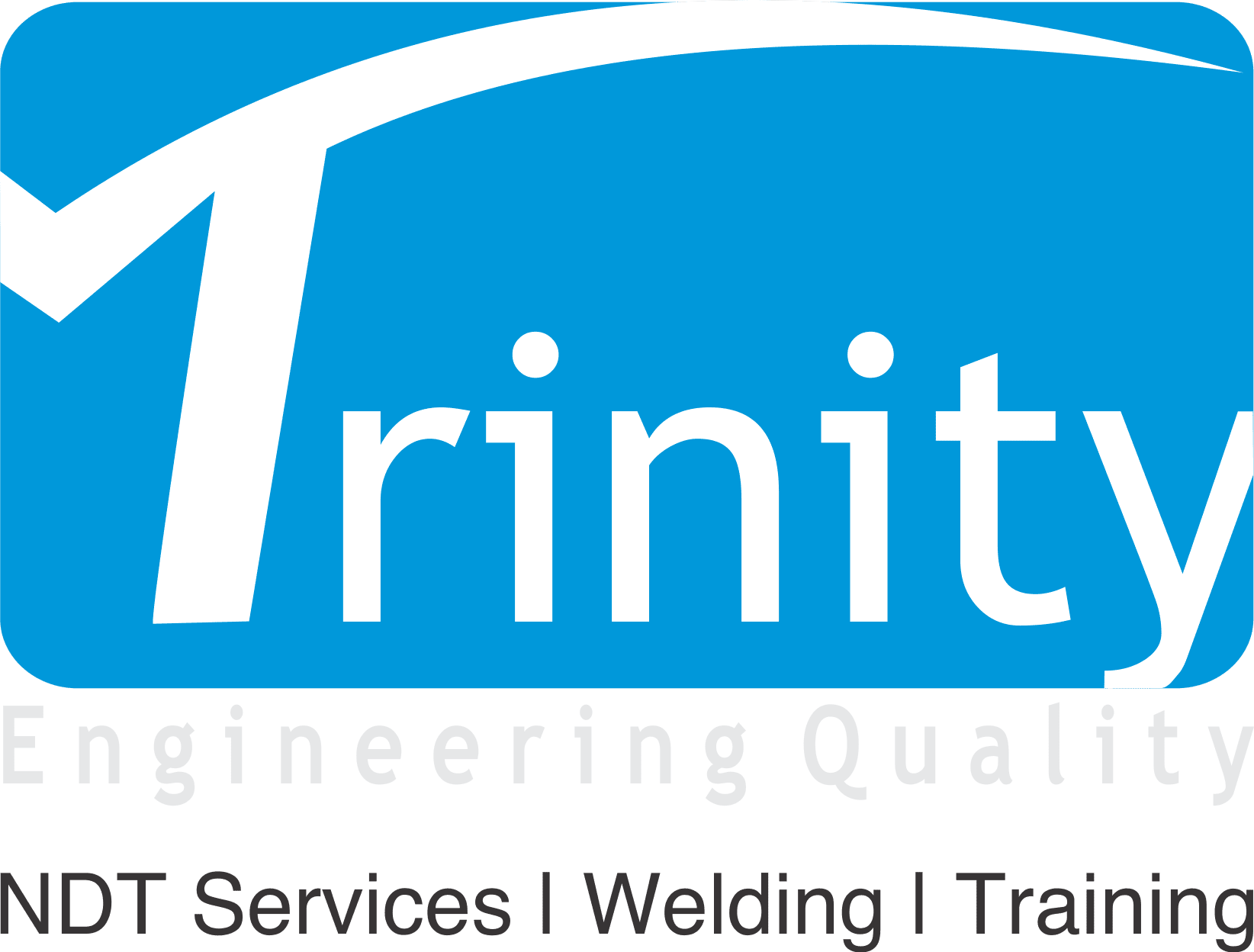Dye Penetrant Testing Services in Bangalore. NABL Accredited Lab.
Fluorescent, visible. Onsite, In-lab Services at Peenya. Experts in DPT Testing of Welds.
ASNT, ISO9712, NAS410 Level II, III in DPT testing. Serves Onsite in India.
Dye Penetrant Testing (DPT) Services Lab in Bangalore. NABL Accredited. scope ASTM E165, ASTM E1417. ASNT, ISO9712, NAS410 Level II, III. Award Winning NDT Service provider in India.
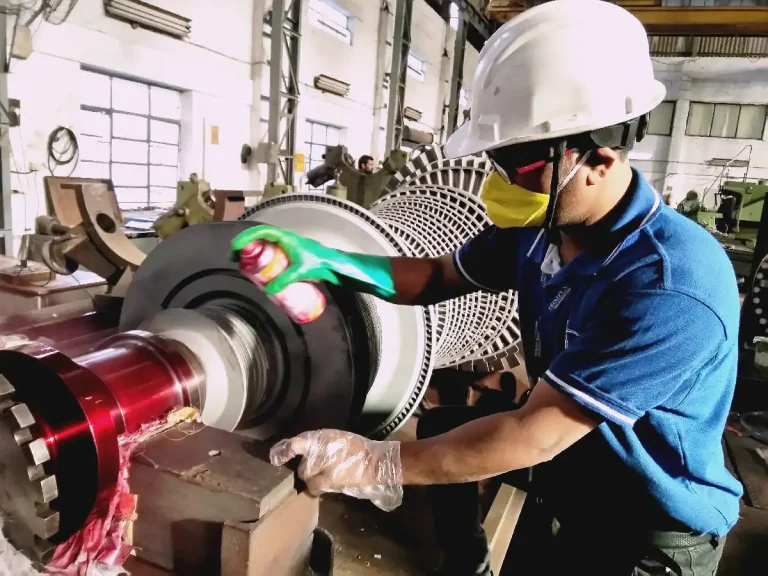
‘Trinity NDT – Testing Lab‘, is an NABL accredited ‘Dye Penetrant Testing (DPT)’ services provider in Bangalore. An independent, Aerospace specialized NADCAP accredited centre in India. Scope includes ASTM E165, ASTM E1417. Both onsite, In-lab services at Peenya Industrial Area, Karnataka. Onsite services. A trusted third party NDT company for 1500+ clients. Liquid penetrant testing experts for welds, chimneys, oil, gas pipelines and castings.
India’s largest facility for Penetrant testing. Serves general engineering, aerospace. Option to choose combination of pre-cleaning, penetrant, developer, personnel qualification. Contact us with your requirement today.
Penetrant, Sensitivities: Facility for Type 1, Fluorescent, method ‘A’ water washable, method ‘D’ post emulsifiable techniques. ‘Magnaflux, USA’ make sensitivity 3, 4 penetrant stations. ‘Type 2, method ‘C’ solvent removable’ technique for onsite inspection of welds.
International Standards: ASTM E165, ASTM E1417, ISO3452.
Pre-cleaning techniques: Ultrasonic cleaning, Diversy cleaning for aerospace components. Solvent cleaning for welds, castings, machined components.
NDT Personnel Certifications: ASNT Level II, III, ISO9712, Aerospace NAS410.
Customers send components to NDT Labs in Peenya, Bangalore. Avail onsite services across India. In-house ASNT/NAS410 Level III. 25+ years experience. NABL accredited DPT testing Services as per ASTM E165, E1417.
Fluorescent Penetrant Inspection, in aerospace, this NDE method finds surface flaws. Cost effective solution for testing forgings, castings and welds. Certified Penetrant testing ASNT NDT Level III experts. NAS410 Level III serves aerospace. ISO9712 Level 2 for testing as per ISO 3452.
Penetrants, Techniques, Sensitivities at Our Labs
Trinity NDT – Liquid Penetrant testing labs serves on varieties of visible, fluorescent types. NDT procedures approved from ASNT/ NAS410 Level III experts in consultation with customer requirements.
As per ASTM E165, ASTM E1417, facility for below types of penetrants,
- Type 1 – Fluorescent
- Type 2 – Visible
Classified based on method used to remove excess penetrant from the part, four methods are,
- Method A – Water Washable
- Method B – Post Emulsifiable, Lipophilic
- Method C – Solvent Removable
- Method D – Post Emulsifiable, Hydrophilic
Fluorescent penetrants are further defined by sensitivity level category. Below are five levels, in increasing order of sensitivity:
- Level ½ – Ultra low
- Level 1 – Low
- Level 2 – Medium
- Level 3 – High and
- Level 4 – Ultra High
Outsource your DPT testing services to our experienced inspectors. Send us your request on WhatsApp.

Penetrant Inspection Procedure
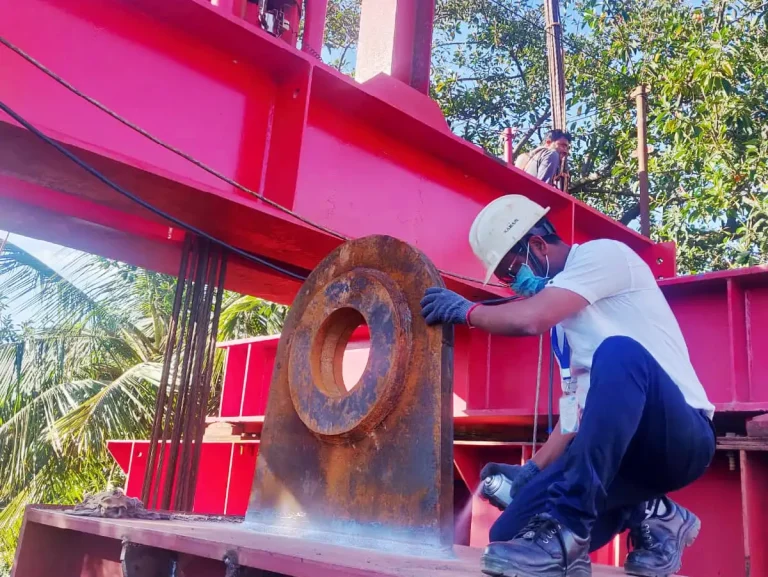
Penetrant inspection is performed using below steps,
- Pre-clean parts
- Apply penetrant
- Allow Dwell time
- Remove excess penetrant
- Dry the surface
- Apply Developer
- Give developing time
- Interpret indications
- Evaluate, record
- Post clean the part
NABL Accredited Lab, for DPT testing in Bangalore
Our DPT test labs at Bangalore are NABL ISO17025 accredited for in-house, onsite inspections. Meets international standards ASTM E165, ASTM E1417. NADCAP accredited for aerospace FPI. Serves automobile, boiler, pressure vessel, railways and aerospace component manufacturers.
NABL scope: Fluorescent type 1, visible type 2, water washable, post emulsifiable, solvent removable penetrants. Sensitivity: S2, S3, S4. Need penetrant inspection services in Bangalore? Contact us.
Personnel with certifications: ASNT Level II, NAS410, ISO9712
Equipment: Stationery type unit and portable kits available. In-house ASNT Level III, NAS410 Level III in penetrant testing.
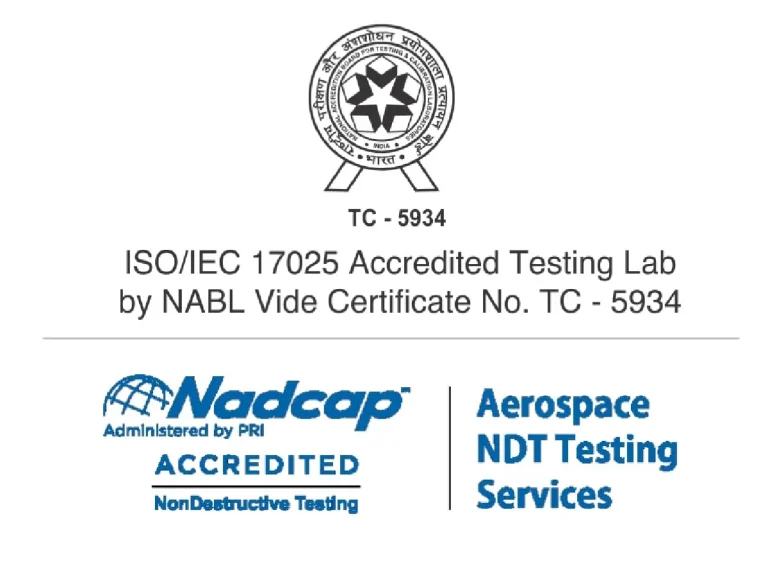
Type 1, Method A, D using Stationery Equipment
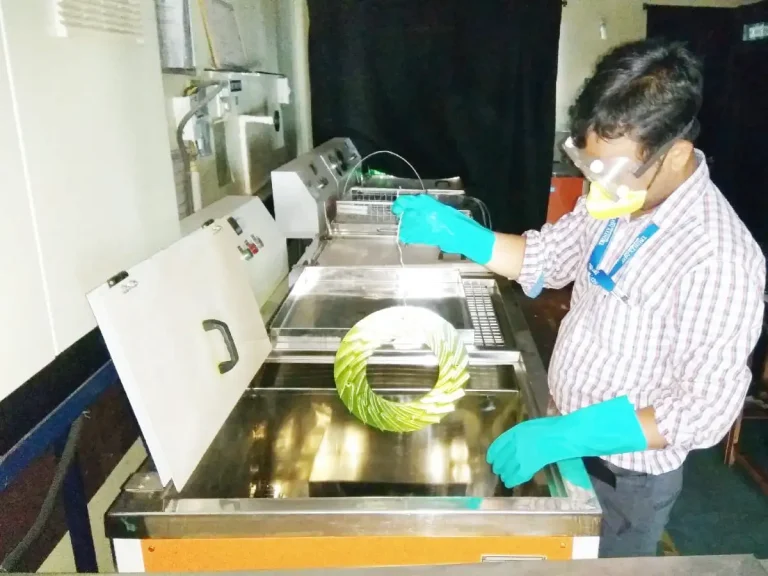
Our NDT Labs equipped for Fluorescent penetrant inspection of aerospace components. Dedicated Stationery Penetrant Inspection line meets NADCAP requirement. Pre-cleaning techniques: Ultrasonic cleaning, alkaline cleaning and solvent cleaning. Facility for FPI inspection of part sizes up to 600mm.
For portable applications, special zone earmarked for type 2, red dye penetrant inspection. 5 Ton EOT crane that handles larger parts. Choose from variety of techniques at our NDT Labs. Method A-water washable, Method D-post emulsifibale. S2, S3 & S4 sensitivity. Standards we follow based on customer: ASTM E165, ASTM E1417, ISO3452.
Inspectors certified to ASNT Level II, ISO9712 and NAS410. An in-house ASNT Level III for approving procedures as per ASME, ISO standards. Undertakes critical Dye penetrant testing both onsite and at our labs in Peenya, Bangalore. Wide experience in handling Welds, Pressure vessels, boiler parts, cross country pipe lines, Castings, Valves, gears, Turbine blades.
Our Aerospace FPI testing labs are approved from Dassault Aviation – France, CEMILAC – DRDO organization – Government of India, Hindustan Aeronautics Ltd – HAL, L & T Aerospace. Just a phone call to request a quotation for penetrant inspection. Serving in and around Bangalore, Mysore which is just 2 hour drive from our works. Request details on WhatsApp.
ASNT Level III Consulting on Liquid Penetrant testing
Trinity NDT provide ASNT Level III consulting services on ‘Liquid Penetant testing’ in Bangalore. Establishing testing facility to setting up of stationery line. Preparing NDT procedure to approval of techniques, our experts can guide clients.
In-house Penetrant Testing certified from ASNT, USA. For aerospace division NAS401 Level III. NDT procedures are duly reviewed, approved. Capability to write, establish and approve DPT testing procedures for client applications. Need our consulting services, know more about ASNT NDT Level III consulting.
Need DPT Chemicals? We Stock, Sale in Bangalore.

We supply Dye penetrant inspection, chemical kits for customers use at workshops. Dealer and stockist for DPT materials in the state of Karnataka. Authorised dealers for Ferrochem, make consumables. We stock at our labs in Peenya Bangalore and sells portable kits including penetrants, cleaners and developers. Available in aerosol cans and 5Litre cans. Before ordering, check with our sales teams for stock.
Also, stockists and dealer in Bangalore for MR Chemicals and Vector make Zchem, Crackchek branded penetrants. Supplies accessories such as aluminium cracked comparator blocks for DPT system checks. Test Kits can be hand picked from our office or couriered to your address anywhere in India. Easy access for customers in Hosur and Mysore stocked from Peenya Industrial Area, Bangalore.
Cost of DPT Chemical kit starts at Rs750/- + GST in Bangalore. Contact Trinity NDT – Sales Manager in Peenya today.
Contact us for your requirements about portable DPT chemicals in Bangalore.
Know About Liquid Penetrant Testing Fundamentals
Understanding the basics
Penetrant testing, also known as dye penetrant inspection (DPI) or liquid penetrant inspection (LPI), is a widely used method of non-destructive testing (NDT) to detect cracks, surface breaks, and other defects in various materials. This guide aims to provide a comprehensive understanding of the basics of penetrant testing, including the process, types, and applications.
Procedure for Penetrant Testing
- Preclean the part. Ensure that no dirt, grease, or any other contaminants are present that could potentially affect the results.
- Identify any visible defects or anomalies.
- Apply penetrant. Use methods such as spraying, brushing, or immersing the object in the penetrant.
- After suitable dwell time, remove excess penetrant.
- Apply developer. This final step helps to draw the liquid out and spread it over the surface, making it easier to see under UV light for fluorescent or visible light for red colour dye.
- Post clean to remove DPT materials from surface to avoid corrosion.
Types of Penetrant Testing
There are several types of penetrant testing, each with its own unique properties and applications. These include:
- Water-washable: This type of penetrant testing is easy to remove with water and is commonly used for large, non-porous components.
- Post-emulsifiable: This requires an emulsifier to be applied before the excess penetrant can be removed. It provides more sensitivity than water-washable penetrants.
- Solvent-removable: This type of penetrant is removed using a solvent. It’s typically used for small, intricate parts where water washing isn’t practical.
Applications
Penetrant testing is used in a wide range of industries and applications, including:
- Aerospace: To detect surface defects in aircraft components.
- Automotive: To check for cracks in engine components.
- Construction: To inspect welds on steel structures.
- Power generation: To identify defects in turbine blades.
In conclusion, penetrant testing is a highly versatile and effective method of non-destructive testing. By understanding the basics, you can better appreciate its value and potential applications in various industries. DPT is a reliable method for testing aerospace hardware. Aircraft components are routinely tested during MRO inspections to find fatigue cracks. Our Labs are specially equipped with NADCAP accredited FPI testing.
Codes and Standards
Even though there are numerous standards on PT testing, ASTM standards ASTM E 165, ASTM E 1417 and ISO3452 are widely recognized. Apart from this, ASME pressure vessel code Section V, API Codes, AWS codes, BS, EN standards provide procedures, personnel, equipment needs and acceptance criteria.
Trinity NDT – Testing Labs uses its ASNT and NAS410 Level III approved procedures that meets international standards, codes and customer specifications.
Key Highlights of facility
- Stationery penetrant inspection equipments
- S2, S3 & S4 sensitivity
- UV lights
- Professionals are qualified and certified to PT Level I, II as per Written Practice framed to the requirements of SNT-TC-1A, NAS410 & ISO9712
- Experienced in house ASNT NDT Level III consultants
- NDT Level III trainers for conducting NDT Level 1, 2 training and certification courses on Liquid penetrant testing.
- Skilled NDT Level 2 certified inspectors
- Sales and Supply of Dye penetrant inspection (DPT), penetrants, cleaners, solvents, developers
Training and Certification programs
Trinity Institute of NDT Technology (A training division of Trinity NDT WeldSolutions Pvt. Ltd) offers world class NDT training and certification courses that meets written practice and framed to the requirements of SNT TC 1A. Learn penetrant testing procedures at our upcoming DPT inspection Level II course. For the next schedule, visit Training Calendar page. Know about fee structure, eligibility criteria for the training courses and register online for the NDT Level II courses.
Participants from over 40 countries have benefited from NDT Level II courses offered as per ASNT SNT TC 1A and ISO9712. Read reviews on Youtube channel
